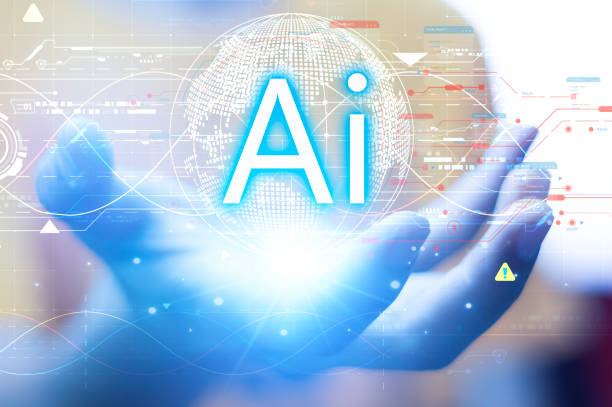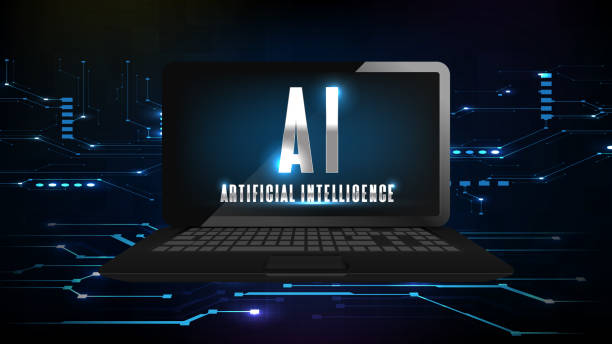What is Artificial Intelligence and Why is it Important?

Artificial Intelligence (AI) is a branch of computer science dedicated to building machines capable of performing tasks that typically require human intelligence.
These tasks include learning, reasoning, problem-solving, natural language understanding, pattern recognition, and decision-making.
The importance of #Artificial_Intelligence is rapidly growing in today’s world, as this technology can revolutionize various industries and significantly increase efficiency and productivity.
Key applications of AI include self-driving cars, virtual assistants, medical diagnosis, data analysis, and cybersecurity.
To better understand the concept of Artificial Intelligence, it can be defined as an endeavor to simulate or imitate human intelligence in machines.
This simulation not only involves performing specific tasks but also includes learning and improving performance over time.
The main difference between artificial intelligence and traditional programming is that in traditional programming, instructions are explicitly and precisely given to the computer, whereas in artificial intelligence, machines are able to learn from data and adapt to new conditions.
This feature makes AI more suitable for solving complex and unpredictable problems.
Artificial intelligence is not just a technology; it is a new paradigm in science and industry that is changing how we live and work.
A review of AI applications shows that this technology can bring significant improvements in various fields, from healthcare to education.
For example, in healthcare, AI can help with faster and more accurate disease diagnosis, while in education, it can help provide personalized learning tailored to each student’s needs.
Disappointed with your e-commerce website’s low conversion rate? Rasawab transforms your online store into a powerful tool for attracting and converting customers!
✅ Significant increase in visitor-to-buyer conversion rate
✅ Unparalleled user experience to boost customer satisfaction and loyalty⚡ Get a free consultation from Rasawab!
Types of Artificial Intelligence

Artificial Intelligence can be categorized into various types based on its capabilities and performance.
One of the most common classifications is based on AI’s abilities, which include Narrow AI, General AI, and Super AI.
Narrow AI, as its name suggests, is only capable of performing specific and limited tasks.
This type of AI is currently very common and is used in many applications such as facial recognition, language translation, and computer games.
More information about Narrow AI indicates that this type of AI can perform its tasks efficiently and accurately, but it cannot perform other tasks or generalize its knowledge to other domains.
General AI is a type of artificial intelligence capable of performing any task that a human can.
This type of AI has not yet been fully developed and largely remains theoretical.
However, extensive research is underway in this field, and many scientists believe that General AI will become a reality in the near future.
Super AI is a type of artificial intelligence that surpasses human intelligence and is capable of solving more complex problems that humans cannot.
This type of AI has also not yet been fully developed and is mostly depicted in science fiction stories.
Research on General AI indicates that the development of this type of AI requires significant advancements in computer science and cognitive science.
Machine Learning and Deep Learning

Machine Learning and Deep Learning are two important subfields of Artificial Intelligence that enable machines to learn from data and improve their performance without explicit programming.
Machine learning involves algorithms capable of recognizing patterns in data and predicting outcomes.
These algorithms can be divided into various types based on the type of data and the problem to be solved.
For example, Supervised Learning algorithms require labeled data, while Unsupervised Learning algorithms can learn from unlabeled data.
Deep learning is a type of machine learning that uses artificial neural networks with multiple layers to analyze data.
These networks are capable of learning more complex and abstract patterns in data and perform better than traditional machine learning algorithms in many applications such as image recognition, natural language processing, and machine translation.
Further study on deep learning shows that this technology can bring significant transformations in various fields, from healthcare to self-driving cars.
For example, in image recognition, deep learning can help with more accurate and faster disease diagnosis, while in self-driving cars, it can help improve their safety and efficiency.
| Algorithm Name | Type | Application |
|---|---|---|
| Linear Regression | Supervised Learning | Housing Price Prediction |
| Logistic Regression | Supervised Learning | Spam Email Detection |
| Decision Tree | Supervised Learning | Fraud Detection |
| K-means Clustering | Unsupervised Learning | Customer Segmentation |
Applications of Artificial Intelligence in Various Industries

The applications of Artificial Intelligence are vast and diverse, visible in almost all industries.
In the healthcare industry, AI can assist in faster and more accurate disease diagnosis, new drug development, and personalized care.
In the financial industry, AI can help with fraud detection, risk management, and providing automated financial services.
In the manufacturing industry, AI can contribute to improving efficiency and productivity, reducing costs, and enhancing product quality.
Furthermore, AI has extensive applications in other areas such as self-driving cars, robotics, cybersecurity, marketing, and advertising.
Applications of Artificial Intelligence in Healthcare demonstrate that this technology can bring significant improvements in various domains, from disease diagnosis to providing personalized treatments.
For example, AI can help doctors diagnose cancer in its early stages, while in the pharmaceutical field, it can assist in developing new drugs with greater efficacy and fewer side effects.
This technology is evolving over time and can quickly establish itself in all industries.
Still don’t have a company website and missing out on online opportunities? With professional corporate website design by Rasawab,
✅ Double your business credibility
✅ Attract new customers
⚡ Free consultation for your corporate website!
Advantages and Disadvantages of Artificial Intelligence

Artificial Intelligence, like any other technology, has its own advantages and disadvantages.
Among the advantages of AI are increased efficiency and productivity, reduced costs, improved quality of products and services, and the ability to solve complex problems.
AI can help companies optimize their processes, make better decisions, and provide superior services to their customers.
Among the disadvantages of AI are high development and implementation costs, the need for high technical expertise and knowledge, and concerns related to ethics and security.
Additionally, some people are concerned that AI may lead to job displacement and exacerbate social inequalities.
An examination of AI ethical issues indicates that the development and use of this technology require attention to ethical and social considerations to prevent potential problems and risks.
For example, it must be ensured that AI is used fairly and without discrimination, and individuals’ privacy is protected.
Challenges Facing the Development of Artificial Intelligence

The development of Artificial Intelligence faces numerous challenges that require joint efforts from researchers, industrialists, and policymakers.
One of the most significant challenges is the scarcity of high-quality and labeled data.
Machine learning algorithms require a large amount of data to learn and improve their performance, but collecting and labeling this data can be time-consuming and costly.
Another challenge is the shortage of skilled professionals in the field of artificial intelligence.
Given the rapid growth of this technology, the demand for skilled specialists in various areas such as machine learning, deep learning, and natural language processing has significantly increased.
Additionally, ethical and legal issues are among the important challenges facing AI development.
Addressing AI challenges requires a comprehensive and multifaceted approach that includes investment in research and development, training skilled human resources, and establishing appropriate laws and regulations.
For example, efforts should be made to collect and label more data, train more AI specialists, and enact laws and regulations that ensure the responsible and fair use of artificial intelligence.
The Future of Artificial Intelligence

The future of Artificial Intelligence is very bright and full of potential.
With continuous advancements in this technology, AI is expected to play a more significant role in many aspects of our lives in the near future.
Important trends in AI include the development of Explainable AI, Ethical AI, and Trustworthy AI.
Explainable AI means that AI algorithms should be able to explain how they make decisions so that users can trust them.
Ethical AI means that artificial intelligence should be used fairly and without discrimination, and individuals’ privacy should be protected.
Trustworthy AI means that artificial intelligence should be secure and reliable, and misuse should be prevented.
Predictions for the future of AI show that this technology can bring significant transformations in various fields, from healthcare to education.
For example, AI can assist in the development of new drugs with greater efficacy and fewer side effects, while in education, it can help provide personalized learning tailored to each student’s needs.
| Feature | Machine Learning | Deep Learning |
|---|---|---|
| Complexity | Less | More |
| Data Requirement | Less | More |
| Hardware Requirement | Less | More |
| Feature Extraction Capability | Manual | Automatic |
How to Start Learning Artificial Intelligence

If you are interested in learning Artificial Intelligence, there are various resources and paths to get started.
One of the best ways is to enroll in online and in-person courses offered by reputable universities and educational institutions.
These courses usually cover the basic concepts of AI, machine learning, and deep learning, helping you acquire the necessary knowledge and skills to enter this field.
In addition, you can utilize free online resources such as books, articles, videos, and blogs.
Many reputable universities and educational institutions offer free online courses in AI that you can take advantage of.
You can also gain practical experience by participating in open-source projects and collaborating with other AI enthusiasts.
The guide to learning Artificial Intelligence indicates that to succeed in this field, in addition to technical knowledge, you also need practice and practical experience.
For example, you can challenge your knowledge and improve your skills by building small and simple projects.
Tired that your e-commerce website hasn’t been generating as much revenue as its potential allows? Rasawab, specializing in professional e-commerce website design, solves this problem permanently!
✅ Increase sales rate and revenue
✅ High loading speed and unparalleled user experience
⚡ Get a free consultation for e-commerce website design
The Impact of Artificial Intelligence on the Job Market

Artificial Intelligence has a significant impact on the job market, and this impact is expected to increase in the near future.
On one hand, AI can lead to the displacement of some jobs, especially those that are repetitive and automatable.
On the other hand, AI can also create new jobs, particularly those requiring specialized skills in the field of AI.
For example, the demand for machine learning specialists, data scientists, and AI engineers is rapidly increasing.
To prepare for the job market changes brought by AI, individuals must keep their skills updated and learn new skills that are compatible with artificial intelligence.
These skills include technical skills such as programming and data analysis, and soft skills such as problem-solving, critical thinking, and creativity.
An examination of the impact of Artificial Intelligence on the job market shows that individuals with the necessary job market skills have a greater chance of succeeding in this field.
For example, individuals with programming and data analysis skills can work in new roles such as AI developer, data scientist, and machine learning engineer.
Ethical Considerations in the Development and Use of Artificial Intelligence

The development and use of Artificial Intelligence require attention to ethical considerations to prevent potential problems and risks.
One of the most important ethical considerations is the issue of discrimination.
AI algorithms can make discriminatory decisions based on the data they have been trained on.
For example, if a facial recognition algorithm is trained on data predominantly featuring images of white individuals, it may have lower accuracy in recognizing the faces of Black individuals.
Another ethical consideration is the issue of privacy.
AI requires a lot of data to learn and improve its performance, but collecting and using this data can violate individuals’ privacy.
Furthermore, accountability is also an important ethical consideration in the field of AI.
If an AI system makes a mistake and causes damage, who is responsible? An examination of AI ethical considerations indicates that the development and use of this technology require the formulation of appropriate laws and regulations to prevent potential problems and risks.
For example, it must be ensured that AI algorithms are used fairly and without discrimination, and individuals’ privacy is protected.
Frequently Asked Questions
| Question | Answer |
|---|---|
| What is the definition of Artificial Intelligence? | It is a field in computer science that aims to create intelligent machines capable of thinking, learning, solving problems, and making decisions like humans. |
| Mention some common applications of Artificial Intelligence. | These include self-driving cars, voice assistants (like Siri and Alexa), recommendation systems (like Netflix and Amazon), facial recognition, and medical diagnosis. |
| What is the difference between Narrow AI (ANI) and General AI (AGI)? | Narrow AI is specialized in one specific task, while General AI possesses human-level intellectual ability to perform any cognitive task. |
| What is Machine Learning and its relationship with Artificial Intelligence? | Machine Learning is a branch of Artificial Intelligence that focuses on developing algorithms that allow systems to learn from data without explicit programming. |
| What are Artificial Neural Networks? | They are computational models inspired by the structure and function of the human brain, used in deep learning to process data and discover complex patterns. |
| Mention some ethical challenges related to Artificial Intelligence. | These include issues of privacy, bias in data and algorithms, job displacement, and accountability in the event of errors or unfair decisions. |
| What is Natural Language Processing (NLP)? | It is a branch of Artificial Intelligence that focuses on enabling computers to understand, interpret, and generate human language in a useful and interactive way. |
| How can Artificial Intelligence affect the job market? | It can lead to the automation of some routine tasks, requiring worker retraining and creating new jobs in the areas of designing, developing, and maintaining AI systems. |
| What is Computer Vision? | It is a field in Artificial Intelligence that enables computers to “see,” understand, and interpret images and videos in the same way humans do, allowing them to recognize objects and faces. |
| What is the importance of data in developing Artificial Intelligence systems? | Data is the fuel that powers AI systems, especially in machine learning. The quality and quantity of data significantly affect the accuracy and performance of models and their ability to learn and make correct decisions. |
And other advertising services from Rasaweb advertising agency:
- Smart Social Media: Professional optimization for digital branding using marketing automation.
- Smart Advertorials: A blend of creativity and technology for digital branding through intelligent data analysis.
- Smart Sales Automation: An effective tool for increasing sales with personalized user experience.
- Smart Content Strategy: An innovative service for improving SEO ranking through marketing automation.
- Smart Conversion Rate Optimization: Professional optimization for online growth using intelligent data analysis.
And over hundreds of other services in internet advertising, advertising consultation, and organizational solutions
Internet Advertising | Advertising Strategy | Advertorials
Resources
Artificial Intelligence on Digikala Mag
AI News on IRNA
AI Articles on Techrato
AI Reviews on Zoomit
? Ready to transform your business in the digital world? Rasaweb Afarin Digital Marketing Agency paves the way for your greater visibility by offering comprehensive services including SEO-optimized website design, search engine optimization, and content marketing.
📍 Tehran, Mirdamad Street, next to Bank Markazi, Southern Kazeroon Alley, Ramin Alley, No. 6



